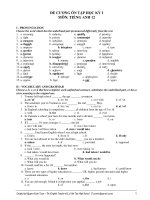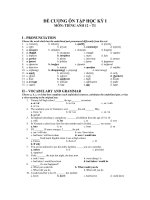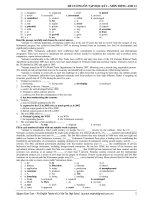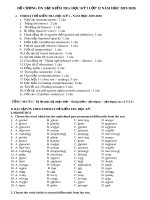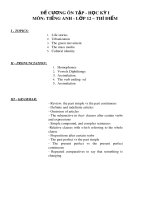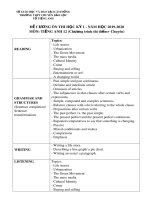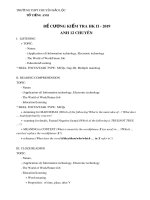ĐỀ CƯƠNG ÔN TẬP HỌC KỲ I – MÔN TIẾNG ANH 12 pot
Bạn đang xem bản rút gọn của tài liệu. Xem và tải ngay bản đầy đủ của tài liệu tại đây (134.5 KB, 7 trang )
ĐỀ CƯƠNG ÔN TẬP HỌC KỲ I – MÔN TIẾNG ANH 12
Nguyen Xuan Tuan – The English Teacher of Le Viet Tao High School. ()
1
1) a. struggled b. organized c. held d. joined
2) a. invest b. investable c. investment d. investor
3) a. committed b. excited c. called d. encouraged
4) a. over b. for c. at d. in
5) a. role b. region c. sector d. section
6) a. potential b. private c. stagnancy d. exports
7) a. walk b. path c. way d. accession
8) a. in b. at c. for d. from
9) a. grow b. growth c. grew d. grown
10) a. a b. an c. the d. ỉ
Read the passage carefully and choose the correct answer.
Vietnam is a densely-populated, developing country that in the last 30 years has had to recover from the ravages of war.
Substantial progress was achieved from1986 to 1997 in moving forward from an extremely low level of development and
significantly reducing poverty.
Since 2001, Vietnamese authorities have reaffirmed their commitment to economic liberalization and international
integration. They have moved to implement the structural reforms needed to modernize the economy and to produce more
competitive, export-driven industries. .
Vietnam's membership in the ASEAN Free Trade Area (AFTA) and entry into force of the US-Vietnam Bilateral Trade
Agreement in December 2001.have led to even more rapid changes in Vietnam's trade and economic regime. Vietnam's exports to
the US doubled in 2002 and again in 2003.
Vietnam joined the WTO (World Trade Organization) in January 2007, following over a decade long negotiation process.
This should provide ail important boost to the economy and should help to ensure the continuation of liberalizing reforms.
Vietnam is working to create jobs to meet the challenge of a labor force that is growing by more than one million people
every year. Vietnamese authorities have tightened monetary and fiscal policies to stem high inflation. Hanoi is targeting an
economic growth rate of 7.5-8% during the next five years.
1. Vietnam's economy is _______.
a. decreasing b. facing crisis c. developing d. backward
2. According to the text, Vietnam _______.
a. used to be well-developed before 1986
b. Vietnam is still in extreme poverty
c. could recover from the consequences of the war soon
d. has been modernizing the economy
3. Vietnam _______.
a. does not export anything to the US
b. exported to the US in 2003 twice as much goods as in 2002
c. did not export goods to the US in 2002
d. did not export goods to the US in 2003
4. The word This refers to _______.
a. Vietnam's joining the WTO b. the WTO
c. the negotiating process d. the Vietnamese economy
5. The word stem has a close meaning to _______.
a. succeed b. stop c. originate d. invrease
Fill in each numbered blank with one suitable word or phrase.
Vietnam is considered a third world country, its people live (1) _____ poverty by the millions. After the (2) _____,
Vietnam's economy remained dominated by small-scale production, low labor productivity, (3) _____, material and technological
shortfalls, and insufficient food and (4) _____ goods. The Doi Moi reforms that were instated in 1986 have shed new light and
added new features to the Vietnamese economy. (5) ____ Vietnamese Communist Party plays a leading role in establishing the
foundations and principles of communism, mapping strategies for economic development, setting growth targets, and (6) _____
reforms. Doi Moi combined government planning with free-market incentives and (7) _____ the establishment of private
businesses and foreign investment, including foreign-owned enterprises. By the late 1990s, the success of the business and
agricultural reforms ushered in under Doi Moi was evident. (8) _____ than 30,000 private businesses had been created, and the
economy was growing at an annual (9) _____ of more than 7 percent. Farming systems research and the international
development projects are a source of new hope for the people of Vietnam. If these recent projects are successful and Doi Moi
continues on its current path the Vietnamese people may (10) _____ a new standard of living. More reforms like Doi Moi need to
take place in order to create a more stable Vietnamese future.
1. a. for b. in c. on d. of
2. a. liberate b. liberation c. liberator d. liberal
3. a. application b. salary c. profession d. unemployment
4. a. consumer b. producer c. spender d. manufacturer
5. a. A b. An c. The d. ỉ
6. a. launching b. flying c. sending d. raising
7. a. found b. promised c. required d. encouraged
8. a. Much b. More c. As d. As more
9. a. rate b. level c. standard d. step
10. a. come b. approach c. reach d. arrive
ĐỀ CƯƠNG ÔN TẬP HỌC KỲ I – MÔN TIẾNG ANH 12
Nguyen Xuan Tuan – The English Teacher of Le Viet Tao High School. ()
2
Read the passage carefully and choose the correct answer.
Preparation is a key to a successful interview. Does the idea of going to a job interview make you feel a little nervous? Many
people find that it is the hardest part of the employing process. But it is not really true. The more you prepare and practice, the
more comfortable you will feel. You should find out as much as possible about the company before you go to the interview.
Understand the products that they produce and the services that they provide. It is also good to know who the customers are and
who the major competitors are. Practice makes perfect. It will also make you feel more confident and relaxed. So, practice your
answers to common questions. Make a list of questions to ask, too. Almost all interviewers will ask if you have questions. This is
a great opportunity for you to show your keenness, enthusiasm, and knowledge.
Make a great impression. The interview is your chance to show that you are the best person for the job. Your application or
resume has already exhibited that you are qualified. Now it is up to you to show how your skills and experience match this
position and this company. The employer will be looking and listening to determine if you are a good fit. He/she will be looking
for a number of different qualities, in addition to the skills that you possess. To make the best impression, dress appropriately;
express your strengths; arrive early, by about 10-15 minutes; be enthusiastic; shake hands firmly; be an active listener; sit up
straight and maintain eye contact; and ask questions
After the interview, follow up with a thank-you note. This is a chance for you to restate your interest and how you can
benefit the company. Your best bet is to try to time it so that the note gets there before the hiring: decision is made. You should
also follow up with a phone call if you do not hear back from the employer within the specified time.
1. The pronoun it refers to ________.
a. the job b. the interview c. the interviewer d. the preparation
2. What does the writer advise you to practice?
a. Asking and answering questions related to the job.
b. Making products that the company produces.
c. Providing services that the company serves.
d. Meeting some customers and competitors.
3. Which should not be shown during your interview?
a. Punctuality b. A firm hand shaking
c. Being properly-dressed d. Weaknesses
4. You can show your qualifications in the
a. dressing style and punctuality b. competing with the competitors
c. resume and letter of application d. eye contact with the interview
5. Which is not included in the writer's advice?
a. You should not communicate with the interviewer after the interview.
b. You 'should make the best impression in the interview.
c. You should write a note to say thanks to the interviewer after the interview,
d. You should telephone the interviewer for any information after the interview.
Fill in each numbered blank with one suitable word or phrase.
The interview is one of the most important (1) _____ in the job search process. When an employer invites you to an
interview, he/she is indicating an (2) _____ in yourself. The interview gives both of you the opportunity to (3) _____ enough
information to determine if you are a good "fit" for each other. Think of an interview as a highly focused professional
conversation. You should (4) _____ the limited amount of time you have learning about the employer's needs and discuss the
ways you can meet these needs. In many cases, you will interview at least, twice before being employed for a (5) _____. Once in
a brief screening interview and at least once again in a (6) _____ serious meeting when you may also talk to many of your
potential coworkers.
A job interview is a strategic conversation with a purpose. Your goal is to show the employer that you have the (7) _____,
background, and ability to do the job and that you can successfully fit into the organization. The interview is also your (8) _____
to gather information about the job, the organization, and future career opportunities to figure out if the position and work
environment are (9) _____ for you. Most employers do not hire people based on certificates or diplomas alone. Personality, (10)
______, enthusiasm, a positive outlook, and excellent interpersonal and communication skills count heavily in the selection
process.
1. a. parts b. roles c. fields d. facts
2. a. interest b. interesting c. interested d. interestingly
3. a. fill b. change c. exchange d. translate
4. a. make b. spend c. post d. apply
5. a. condition b. location c. satisfaction d. position
6. a. most b. mostly c. more d. more than
7. a. skills b. aspects c. appearances d. weaknesses
8. a. fates b. feasts c. lucks d. opportunities
9. a. fit b. right c. accurate d. exact
10. a. confide b. confidence c. confident d. confidently
University Entrance Examination is very important in Vietnamese students. High school graduates have to take it and get
high results to be admitted to universities. The pressure on the candidates remains very high despite the measures that have been
taken to reduce the heat around these exams, since securing a place in a state university is considered a major step towards a
successful career for young people, especially those from rural areas or disadvantaged families. In the year 2004, it was estimated
that nearly 1 million Vietnamese students took the University Entrance Examination, but on average only 1 out of 5 candidates
ĐỀ CƯƠNG ÔN TẬP HỌC KỲ I – MÔN TIẾNG ANH 12
Nguyen Xuan Tuan – The English Teacher of Le Viet Tao High School. ()
3
succeeded. Normally, candidates take 3 exam subjects, and each lasts; 180 minutes for the fixed group of subjects they choose.
There are 4 fixed groups of subjects: Group A: Mathematics, Physics, and Chemistry; Group B: Mathematics, Biology, and
Chemistry; Group C: Literature, History, and Geography; Group D: Literature, Foreign Language, and Mathematics.
In addition to universities, there are community colleges, art and technology institutes; professional secondary schools, and
vocational schools which offer degrees or certificates from a-few-month to 2-year courses.
According to Vietnam's Ministry of Education and Training, there are currently 23 non-public universities, accounting for
11% of the total number of universities. These non-public universities are currently training 119,464 students, or 11.7% of the
total number of students. The government is planning to increase the number of non-public universities to 30% by 2007.
1. University Entrance Examination in Vietnamese is very _______.
a. interesting b. stressful c. free d. easy
2. The word those refers to _______.
a. exam subjects b. young people c. universities d. examinations
3. In 2004, the proportion of the students who got success in University Entrance Examination was about _______ percent.
a. 5 b. 10 c. 20 d. 50
4. Which sentence refers to the University Entrance Examination in Vietnam?
a. Students find it easy to get success in the University Entrance Examination.
b. Math is compulsory in the University Entrance Examination.
c. Students are not allowed to choose their exam subjects.
d. There are four fixed groups of exam subjects for students to choose.
5. According to the passage, _______.
a. the Vietnamese government will close all non-public universities by next year.
b. the Vietnamese government does not appreciate non-public universities
c. the Vietnamese government encourages the establishing of non-public universities.
d. Vietnamese students have no alternative to continue their higher study besides universities.
Fill in each numbered blank with one suitable word or phrase.
The University of Oxford, informally called "Oxford University", or simply
"Oxford", (1) ______ in the city of Oxford, in England, is (2) ______ oldest university in the English-speaking world. It is also
considered as one of the world's leading (3) ______ institutions. The university traces, its roots back to at least the end of the 11th
century, (4) ______ the exact date of foundation remains unclear. Academically, Oxford is consistently ranked in the world's top
ten universities. The University is also open (5) ______ overseas students, primarily from American universities, who may (6)
_____ in study abroad programs during the summer months for more than a century, it has served as the home of the Rhodes
Scholarship, (7) ______ brings highly accomplished students from a number of countries to study at Oxford as (8) ______ The
University of Oxford is also a place where many talented leaders from all over the world used to study. Twenty-five British Prime
Ministers attended Oxford, including Margaret Thatcher and Tony Blair. At (9) ______ 25 other international leaders have been
educated at Oxford, and this number includes King Harald V of Norway and King Abdullah II of Jordan. Bill Clinton is the first
American President to attend Oxford. Forty-seven Nobel (10) __ winners have studied or taught at Oxford.
1. a. put b. placed c. located d. stood
2. a. a b. an c. the d. ỉ
3. a. learning b. academic c. graduating d. scholar
4. a. although b. because c. since d. if
5. a. to b. for c. from d. up
6. a. write b. name c. enroll d. require
7. a. that b. where c. whose d. which
8. a. postgraduates b. postgraduated c. postgraduation d. postgraduating
9. a. last b. least c. late d. lately
10. a. present b. gift c. medal d. prize
Read the passage carefully and choose the correct answer.
As Chinese society changes, higher education is undergoing major transformations. The university model of the United
States and other Western countries has a powerful influence. New trends in Chinese higher education are attracting the attention
of global educators. Since the establishment of Western-oriented modern universities at the end of nineteenth century, Chinese
higher education has continued to evolve. Over the past two decades, however, tremendous economic development in China has
stimulated reforms in higher education that have resulted in some remarkable changes.
The first modern institution, Peiyang University, was founded in Tianjin. The university changed its name to Tianjin
University in 1951 and became one of the leading universities in China: Next, Jiaotong University was founded in Shanghai in
1896. In the 1950s, most of this university was moved to Xi'an, an ancient capital city in northwest China, and became Xi'an
Jiaotong University; the part of the university remaining in Shanghai was renamed Shanghai Jiaotong University.
Tianjin University celebrated its hundredth anniversary in 1995, followed by Xi'an Jiaotong and Shanghai Jiaotong
Universities in 1996. Other leading universities, such as Zhejiang University (1897), Beijing University (1898), and Nanjing
University (1902) also recently celebrated their hundredth anniversaries, one after another. These celebrations marked the
beginning of a new chapter in Chinese higher education.
1. The text is about _______.
a. Chinese education system
b. some famous universities in China
ĐỀ CƯƠNG ÔN TẬP HỌC KỲ I – MÔN TIẾNG ANH 12
Nguyen Xuan Tuan – The English Teacher of Le Viet Tao High School. ()
4
c. the western influences on Chinese education
d. application for a university in China
2. Chinese higher education _______.
a. is not affected by any others
b. has not really well-developed
c. has developed since the end of nineteenth century
d. is not paid any attention by global educators
3. Chinese higher education _______.
a. has been stable since nineteenth century
b. has decreased over the past two decades
c. has not got any changes
d. has been affected by the country's economic development
4. Tianjin University was founded in _______.
a. 1895 b. 1896 c. 1950 d. 1951
5. Which university celebrated the hundredth anniversaries in 2002?
a. Nanjing University b. Shanghai Jiaotong University
c. Xi'an Jiaotong University d. Beijing University
Full in each numbered blank with one suitable word or phrase.
Since China adopted its open-door (1) _____ approximately twenty-five years ago, Chinese higher education has begun once
again to draw closer to the (2) _____ Western world. China's (3) _____ to send scholars and students to the United States at the
end of the 1970s, after thirty years of hostility between the two countries, marked a dramatic turning (4) _____ in the nation's
educational history. Today, about 50,000 Chinese students, are studying in the United States, accounting (5) _____ 10 percent of
the total international students in the country. More and (6) _____ Chinese students have gone to other countries to study.
According to statistics from the United Nations Educational, Scientific, and Cultural Organization (UNESCO), China (7) _____
more students than any other country to study abroad. In the other direction, many students from the United States and (8) _____
are going to China to study language, culture, history, traditional Chinese medicine, science, engineering, and other (9) ______.
The increasing number of international students worldwide demonstrates a relatively quick change in the (10) _____ of global
education.
1. a. way b. law c. rule d. policy
2. a. progress b. advanced c. head d. reach
3. a. decide b. decisive c. decision d. decider
4. a. point b. spot c. top d. stain
5. a. for b. to c. up d. over
6. a. as b. more c. than d. much
7. a. regards b. mails c. posts d. sends
8. a. elsewhere b. wherever c. where d. whereas
9. a. matters b. things c. fields d. items
10. a. interfere b. integration c. exchange d. mixture
Fill in each numbered blank with one suitable word or phrase.
Here's some advice for trying to find the university that works for you.
1. You need to examine (1) _____ and your reasons for going to university before you start your search. Why are you
going? What are your abilities and strengths? What are your weaknesses? What do you want out of life? Are you socially
self-sufficient (2) _____ do you need warm, familial (3) _____? Talk with your family, friends and high-school counselors as
you ask these questions. The people (4) _____ know you best can help you the most with these important issues.
2. Very few high-school students have enough information or (5) _____ to choose a major. You need to be well (6) _____
to determine your interest and aptitude. Many students (7) _____ their minds two or three times before they settle on a major.
3. If you do not have to go to university right (8) _____ it is never too late. There is no such thing as the perfect time to start
university. Some students benefit from a year off to work, study or travel, and these experiences (9) _____ them to be better,
more engaged students. Some students choose to apply to university and gain admission and then defer their entrance, while
others wait to apply until after they have had (10) _____ alternative experience.
1. a. you b. your c. yours d. yourself
2. a. or b. but c. nor d. either
3. a. support b. bringing c. feeding d. growth
4. a. which b. whom c. who d. whose
5. a. expenditure b. experience c. experiment d. expert
6. a. prepare b. prepared c. preparation d. preparative
7. a. transform b. translate c. change d. convert
8. a. for b. up c. over d. away
9. a. allow b. make c. let d. advise
10. a. a b. an c. the d. ỉ
IV – WRITING
A-Error Identification.
ĐỀ CƯƠNG ÔN TẬP HỌC KỲ I – MÔN TIẾNG ANH 12
Nguyen Xuan Tuan – The English Teacher of Le Viet Tao High School. ()
5
1. Do you ever feel that life is not being fair to you because you cannot
A B C
seem to get the job where you want or that really suits you?
D (which / that)
2. Education and training are an important steps in getting the kind of job
A B (no article) C
that you would like to have.
D
3. We all know that we have to work hardly to earn a living ourselves
A B (hard) C
and support the family.
D
4. Anyone where works is regarded as a useful member of our society.
A B (that/who) C D
5. We are working, that means that we are contributing goods and
A B C
services to our society. (which)
D
6. The term economic reform refers to policies directing by the
A B (directed)
government to achieve improvements in economic efficiency.
C D
7. Economic reform usually refers to actions of the government to improve
A B C
efficiency in economy markets.
D (economic)
8. Economic reform has dominated Australian economic policy from
A B
the early 1980s until the end of the 20th century. (dominated)
C D
9. The goal of Chinese economic reform was to generating sufficient
A B (generate)
surplus value to finance the modernization of the mainland Chinese economy.
C D
10. Economic reforms started since 1986 in Vietnam have helped millions
A B
of people to be out of poverty and bringing the poverty rate down.
C D (bring)
11. The education children are received during their primary years is
A B (receiving)
crucial for both their personal development and their country as a
C D
whole.
12. The major goals of primary education is to achieve basic literacy and
A B C D
numeracy among all students. (are)
13. It is primary education that establishes foundations in science
A B
geography, history, as well other social sciences for young students.
C (as well as) D
14. Most parents prefer an education system which offers the children
A B C
widest study options in the world.
D (the widest)
15. The purpose of secondary education is to give common knowledge and
A B
to prepare for either higher education and vocational education.
C D (or)
B -Choose the sentence which has the closest meaning to the original one.
1. If I were taller, I could reach the top shelf:
a. I am not tall enough to reach the top shelf.
b. I am too tall to reach the top shelf.
c. I cannot reach the top shelf because I am very tall.
d. In spite of being tall, I cannot reach the top shelf.
ĐỀ CƯƠNG ÔN TẬP HỌC KỲ I – MÔN TIẾNG ANH 12
Nguyen Xuan Tuan – The English Teacher of Le Viet Tao High School. ()
6
2. If only I had studied hard enough to pass the final exam.
a. I regret not studying hard enough to pass the final exam.
b. I had studied hard enough and I passed the final exam.
c. I studied too hard to pass the final exam.
d. I studied hard otherwise I would fail the final exam.
3. John speaks Chinese fluently because he used to live in China for ten years.
a. Suppose John has lived in China for ten years, he can speak Chinese fluently.
b. Provided that John lived in China for ten years, he could speak Chinese fluently.
c. Unless John had lived in China for ten years, he could not have spoken Chinese fluently.
d. John could not speak Chinese fluently if he had not lived in China for ten years.
4. Peter said if he were me he would stop smoking.
a. I wanted Peter to stop smoking and he promised to do.
b. Peter promised to stop smoking.
c. Peter said he would stop smoking as I wanted him to.
d. Peter advised me to stop smoking.
5. I will agree to these conditions provided that they increase my salary.
a. They did not increase my salary so I quit the job.
b. I will only agree these conditions if they give me more money.
c. They give me more money or I will only agree these conditions.
d. Unless they give me more money, I will only agree these conditions.
6. Those who are riding a motorbike are not allowed to take off their helmet.
a. Those who are wearing a helmet are not allowed to ride a motorbike.
b. It is the helmet that one needn't wear when he is riding a motorbike
c. You should not wear a helmet when you are riding a motorbike.
d. People must never take their helmet off while they are riding a motorbike.
7. John, whose cough is terrible, needs to see a doctor.
a. John's terrible cough prevents from seeing a doctor.
b. John needs to see a doctor because of his terrible cough.
c. John's doctor does not want to see him because he has a bad cough.
d. John's terrible cough forces him to see a doctor.
8. The last time when I saw her was three years ago.
a. I have often seen her for the last three years.
b. About three years ago, I used to meet her.
c. I have not seen her for three years.
d. I saw her three years ago and will never meet her again.
9. It is the earth's gravity that gives us our weight.
a. If there were not the earth's gravity, we would be weightless.
b. Due to the earth's gravity we cannot weigh anything.
c. We are overweight because of the earth's 'gravity.
d. The earth's gravity is given weight by people.
10. It was your assistance that enabled us to get achievement.
a. But for you assistance, we could not have, got achievement.
b. Your assistance discouraged us from get achievement.
c. If you assisted us, we could not get achievement.
d. Without your assistance, we could get achievement.
11. "How beautiful is the dress you have just bought!" Peter said to Mary.
a. Peter promised to buy Mary a beautiful dress.
b. Peter said thanks to Mary for her beautiful dress.
c. Peter complimented Mary on her beautiful dress.
d. Peter asked Mary how she had just bought her beautiful dress.
12. She raised her hand high so that she could attract her teacher's attention.
a. Because her teacher attracted her, she raised her hand high.
b. To attract her teacher's attention, she raised her hand high.
c. Though she raised her hand high, she could not attract her teacher's attention.
d. She had such a high raising of hand that she failed to attract her teacher's attention.
13. "Hello, Mary!" Peter said. '
a. Peter said hello Mary. b. Peter said Mary hello.
c. Peter told Mary hello d. Peter greeted Mary.
14. Julie and Anne had not met each other before he party.
a. Julie and Anne got acquainted when they were at the party.
b. The party prevented Julie and Anne from meeting each other.
c. The party was the place where Julie and Anne could not meet each other.
d. Julie and Anne used to meet each other for the party.
15. "Why don't you ask the teacher for help?" Peter asked me.
a. Peter advised me to ask the teacher for help.
ĐỀ CƯƠNG ÔN TẬP HỌC KỲ I – MÔN TIẾNG ANH 12
Nguyen Xuan Tuan – The English Teacher of Le Viet Tao High School. ()
7
b. Peter recommended me not to ask the teacher for help. ,
c. Peter told me the reason why I did not ask the teacher for help.
d. Peter suggested that he should ask the teacher for help.
16. We have decided that the work they do is unacceptable.
a. As they do the work which we have decided is unacceptable.
b. They have been decided that the work they do is unacceptable.
c. It has been decided that the work being done is unacceptable.
d. We have decided that we accept the work they do.
17. If you honor me, I will appreciate it.
a. If I am to be honored, it is to be appreciated.
b. Thank you for your appreciation to honor me.
c. Because of your honor, I will appreciate.
d. You are appreciated to honor me.
18. Barry continued to smoke even though we had advised him to quit.
a. Barry took our advice so he stopped smoking.
b. If we had advised Barry, he would have quit smoking.
c. Barry did not quit smoking because of our advice.
d. Despite being told not to smoke, Barry continued to do.
19. Many people think Steve stole the money.
a. It was not Steve who stole the money.
b. Steve is thought to have stolen the money.
c. Many people think the money is stolen by Steve.
d. The money is thought to be stolen by Steve.
20. The man suddenly realized that the neighbor was watching him.
a. The man suddenly realized that he was -being watched by the neighbor.
b. The neighbor was watching the man and he suddenly realized that.
c. The neighbor was suddenly realized the man and watching him.
d. The man suddenly realized that he was watched by the neighbor.
Chúc các em thành công !

